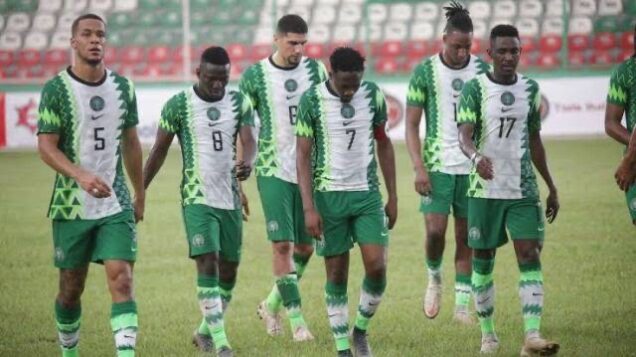Eating the rich
Ahead of the second leg of the Super Eagles clash with the Black Stars of Ghana, the regular tickets were advertised as free for willing Nigerian spectators. It was a bid to guarantee Nigeria’s “home advantage” in hosting the old rival, and draw citizens who, ordinarily, wouldn’t have wasted N2,500 to see even Messi and […]

Super Eagles
Ahead of the second leg of the Super Eagles clash with the Black Stars of Ghana, the regular tickets were advertised as free for willing Nigerian spectators. It was a bid to guarantee Nigeria’s “home advantage” in hosting the old rival, and draw citizens who, ordinarily, wouldn’t have wasted N2,500 to see even Messi and Ronaldo, to MKO Abiola Stadium. What was designed as a strategy to have a dominant crowd to cheer the senior National Team to Qatar erupted into crass vandalism when the Eagles failed to soar. The black stars shone more brightly, and left the “regular” Nigerians to eat their renovated infrastructure and the guarded crowd in the VIP section.
The thuggery at play on the pitch was coloured by the realization that the facility being destroyed was a $360 million project delivered by then President Olusegun Obasanjo ahead of the 8th All African Games (COJA) in 2003. Of course, a nation’s poverty isn’t an excuse to pass up constructing grand infrastructure, but that an overwhelming segment of the population at the stadium could not attend such a historic event without a free ticket is frightening. It’s not really about the affordability of the tickets, which are quite cheap, but the spectators’ economics of scale.
- Senate gets ultimatum to probe ‘contract scam’ in NPC
- Obi of Onitsha: A phone call stopped me from boarding attacked Abuja-Kaduna train
A day earlier, the Abuja – Kaduna train was bombed by a cult of bandits, and this tragedy cast a dark shadow over the stadium. There was a marked disinterest in the outcome of the match so much that when President Buhari was reported to have been at the stadium, which turned out to be false, it drew national ire. The train, said to have had about 1000 passengers, was derailed by the explosion, with several passengers abducted, injured and shot dead.
The vandalism at the stadium and the barbarism on the train have something in common that doesn’t seem to have alarmed us, or perhaps our pretence is more soothing than acknowledging the reality. While the rampaging vandals at the stadium were mostly from a disadvantaged economic class, the bandits who attacked the train reportedly targeted Business Class passengers, who are the hypothetical haves, and were said to also have informants on the train who pointed out ransom-worthy targets.
The two tragedies brought forth the delicate balance of Nigeria’s class tension, and emphasized the fragility of the rich and the seeming rich in Nigeria. Whether at the Abuja stadium or on the Kaduna-bound train, the vulnerability of the upper-class and the so-called middle-class was more pronounced, and it’s an indictment of the country’s policymakers and their cross-generational failure to bridge the gap between the haves and the have-nots.
One of the most prescient prognoses of Nigeria’s class warfare was the famous commentary on the sidelining of the poor attributed to Chief Obafemi Awolowo. “The children of the poor you failed to train,” he’s often quoted to have said, “will never let your children have peace.” It was a dystopian lens into what Nigeria has materialized in present-day Nigeria, and, as tasteless as it seems, it’s a reality we can’t afford to play down in our quests for answers.
When you build “fancy” infrastructure without solving the nation’s poverty problem, you are merely guiding the rich and the seeming rich to their slaughterhouse. This is the threat the haves witnessed at the Abuja stadium and on that misfortunate train to Kaduna. Nigeria is paying the price of decades of its refusal to prioritize the economic yearnings of the have-nots, the class that has had its welfare wrecked by our sustained public-sector corruption.
But the worst victims of the manifesting tragedy are the citizens who identify as the nation’s fragile middle-class. They lack the economic power to afford the luxury of the political elite responsible for the collapse of the nation, and yet find themselves sharing in the blame and fiercely accused and threatened by the under-class, and the criminals who rush to cite the excursuses of the political class as the reason for their vandalism and banditry.
Perhaps, it’s because the politicians and the apolitical elements of the middle-class overlap in their national roles. Their prized education makes this possible, and political offices have become safety nets of which both sides dream to be immune to Nigeria’s dysfunctions. Every election year, this quest for social protection becomes palpable, and yet the victorious elements never get to redeem the class warfare.
Next year, Buhari’s government is coming to an end, and most of the appointees are going to be as vulnerable as these citizens they are quick to say are “overreacting” whenever they demand a responsive and responsible government. Like their predecessors, they are also going to transition into anti-government activists, churning out cerebral and pragmatic solutions to Nigeria’s class tension, and masquerading as friends and redeemers of the underclass, which they never implemented when they had the chance to do so.
